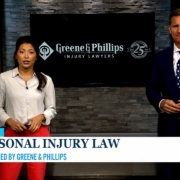Whiplash After A Car Wreck
When people think about injuries sustained in car accidents, they often picture broken bones, bruises, or other visible wounds. One of the most common and frequently overlooked injuries, however, is whiplash. Unlike cuts or fractures, whiplash injuries may not be immediately noticeable, but they can have serious long-term effects if left untreated.
What is Whiplash?
Whiplash is a soft tissue injury to the neck, typically caused by a sudden jerking motion of the head, most often associated with rear-end automobile accidents. This abrupt movement forces the neck into a rapid back-and-forth motion, similar to the cracking of a whip, hence the name. The trauma stretches and tears muscles, tendons, and ligaments in the neck, and in severe cases, can even affect the spine and brain.
Symptoms of Whiplash
While some symptoms may present immediately after an accident, others may take hours or days to develop. The most frequently reported symptoms include:
- Neck pain and stiffness
- Headaches, often originating at the base of the skull
- Reduced range of motion in the neck
- Shoulder, upper back, or arm pain
- Tingling or numbness in the arms
- Fatigue and dizziness
- Difficulty concentrating or memory problems
- Irritability and sleep disturbances
In some cases, whiplash can also cause symptoms consistent with traumatic brain injury (TBI), particularly if the impact was strong enough to cause the brain to move within the skull. This can lead to cognitive disturbances and emotional challenges that may persist for months.
The Urgency of Medical Attention
According to David Greene of Greene & Phillips Injury Lawyers, one of the most important steps you can take after a car accident is to seek medical attention—even if you feel fine. The body often masks injury symptoms through an adrenaline rush and stress response following trauma. Individuals may walk away from an accident feeling lucky, only to experience debilitating symptoms a day or two later.
Failing to see a doctor can be harmful in two ways: First, it delays potentially necessary treatment, increasing the risk of complications. Second, it creates what insurance companies call a “gap in treatment,” which can be used to argue against the legitimacy of your injury claim.
Medical Complications Associated with Whiplash
Whiplash is more than just neck pain. If left untreated, it can lead to chronic pain, mobility issues, and long-term complications, such as:
- Chronic Neck and Back Pain: Damage to muscles and ligaments can cause long-lasting discomfort that interferes with daily activities.
- Cervical Spine Damage: Severe cases of whiplash may involve herniated discs or vertebral misalignment, which can affect spinal nerves and lead to radiating pain or weakness.
- Temporomandibular Joint Dysfunction (TMJ): The impact that causes whiplash may also affect the jaw, leading to jaw pain, difficulty chewing, and clicking sounds when opening the mouth.
- Vertigo and Balance Issues: Injury to the cervical spine or inner ear structures can disrupt balance and cause persistent dizziness.
- Neurological Symptoms: Nerve impingement can result in numbness, tingling, or weakness in the arms and hands, and cognitive disturbances related to concussion or brain trauma.
Early diagnosis through physical exams, imaging (such as MRI or CT scans), and a detailed medical history is essential to rule out more serious injuries and to establish a treatment plan.
The Role of Proper Documentation
If you experience symptoms of whiplash, it is crucial to visit a healthcare provider as soon as possible. Whether you go to the emergency room, urgent care, or your primary care physician, what matters most is creating a clear and timely medical record. Documenting that you were experiencing pain or discomfort on a specific date and receiving treatment will help support your legal claim should you choose to pursue compensation.
Insurance companies frequently scrutinize injury claims and often attempt to minimize payouts by suggesting that the injury is unrelated to the accident or occurred later. Accurate and immediate documentation is your best defense against these tactics.
Don’t Ignore Your Pain
Some people may downplay their injuries, especially if they’ve been involved in contact sports or have a high pain tolerance. But just because the pain seems manageable doesn’t mean it isn’t serious. Whiplash is a real and medically recognized condition that deserves immediate and thorough care. Ignoring symptoms now can lead to increased suffering and costly medical treatment later on.
If you’re unsure whether your symptoms are serious, err on the side of caution. Pay attention to how you feel in the hours and days after a crash. Any headaches, stiffness, or cognitive changes should be taken seriously.
How Greene & Phillips Injury Lawyers Can Help
At Greene & Phillips, our attorneys have handled thousands of car accident and soft tissue injury cases across Alabama and the Southeast. We understand the medical complexities involved with whiplash and related injuries. Our legal team works closely with medical professionals to ensure that your condition is properly evaluated and that you receive the treatment you need.
When you hire Greene & Phillips, we will:
- Help you find appropriate medical care if you haven’t yet been treated
- Ensure your injuries are properly documented and linked to the accident
- Handle all communication with insurance companies
- Pursue full compensation for medical expenses, lost wages, pain and suffering, and any long-term disability
We take pride in making the legal process as easy as possible for our clients, so they can focus on healing and recovery.
How to Contact Greene & Phillips
If you’ve been in a car accident and are experiencing any signs of whiplash or discomfort, don’t wait. Reach out to Greene & Phillips today. You can or come by our office at 51 North Florida Street in Midtown Mobile. Walk-ins are always welcome: no appointment is necessary.
At Greene & Phillips, we’re here to help you every step of the way.








